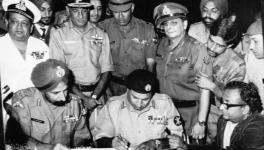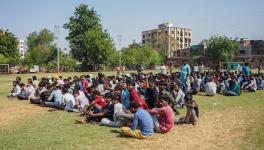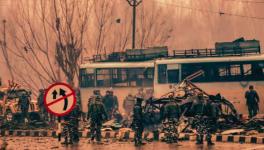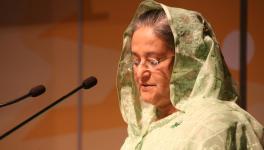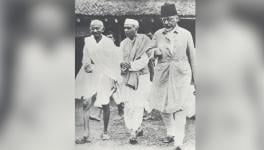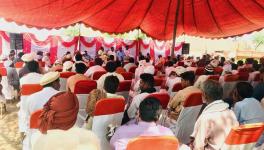Tracking Radical Islam in Bangladesh
Is the surge in terror cases in Bangladesh due to a growing IS presence, or is this a byproduct of home grown radical Islam? What role has the Sheikh Hasina government played in checking it? Javed Anand discusses radical Islam in Bangladesh and its implications on South Asian geopolitics. The interview was done over phone call.
Rough Transcript
Pranjal: Hello and welcome to Newsclick. Today, we are going to discuss about the recent series of events that have taken place in Bangladesh and what is the way ahead. To discuss the issue we have with us senior journalist, Javed Anand, who is also a co-editor with Sabrang India.
Over the last few months you have seen that regulaly the bloggers, various secular voices, democratic activists have been attacked in Bangladesh. And then it has been followed by an attack in Dhaka. IS has claimed that, it is their deed. And if we look at it, IS has started increasing it's intervention in South Asia. Do you see just merely an intervention of IS or is it also a by-product of their home grown problems?
Javed Anand (JA): I think it might be useful to go back a little and see what is happening in terms of the Muslim world in the last several decades. We need to look closely at three Muslim leaders. One - Abul Ala Maududi of the Indian sub-continent who founded the Jamaat-e-Islami. Two - Syed Qutub, who did not found the Muslim Brotherhood. Muslim Brotherhood was founded before he came into picture from Egypt. And we go back to Mohammad Ibn Abdul Wahab of the Najaf region in Arabia which is part of today'ss Saudi Arabia. These three people in their different ways to simplified things to put it in simple words, basically propounded or propagated the idea that it is not enough for Muslims to live their lives. It is not enough for Muslims to worship Allah and live their life according to Allah's vision as spelt out in the Quran and etc. It is much more than that. It is the bounding duty of every Muslim man and woman to strive with every means possible to establish Allah's laws, sovereignity in the world. Because, only Allah's sovereign and his laws must prevail. And therefore, it is a duty of every man and woman to kind of strive by every means possible to establish his laws in the world. Otherwise we can say it's political Islam. Now some people say that within political Islam itself, there is a kind of non-violent political Islam and violent political Islam. Without going there what we can say for sure is that, since the Jihad or what is called Jihad in Afghanistan against the Soviet occupation, Afghanistan proved to be the laboratory, where the ideas of Abdul Wahab, the ideas of Syed Qutub, the ideas of Abul Ala Maududi and their followers who were the part of their Jihad who came from other parts of world intermingled, cross fertilized a kind of Jehad. The first case was fought throughout the Soviet forces in Afghanistan. And later on, we know what is happening in across the world. The point is that, this question that, it is not enough to practice Islam yourself but you must strive by every means possible to establish Allah's laws basically introduces element of force inevitably. So you might on the one hand have many followers of Wahab or Qutub or Maududi. But the germ of the idea that the Islam must be forced, Sharia law, Islamic state is what needs to be established, etc is quite a germ of this idea exists within this. What happened after the Soviet move out of Afghanistan proved to be a huge hype on Muslims who subsrcibe to this world view, of this idea of political Islam. They believed that, they defeated one of the two super powers of the world at that time. And some years earlier, Ayatollah Khomeini and his people in Iran had overthrown the Shah's regime which was supported by other super power of the world. So this sent Muslims who subscribe this kind of world view on huge lies and it gives a huge spurt to such ideas and that spread across the Muslim world firstly. Secondly, after the Soviets are left Afghanistan, those who have come from different countries - there were not so many to best of my knowledge from India or Bangladesh at that time but from Pakistan, from other parts of the Islamic countries - they went back to their countries, carrying back germs of those ideas to spread those ideas. These ideas have also found their expression that found, their takers in Indian sub continent as well. And the backdrop of this, is the year 2013 that the international crimes tribunal Bangladesh, more commonly referred to as the war crimes tribunal, appointed by the Sheikh Hasina government in 2009 after she returned to power. In the early part of 2013, some of the top leaders of the Jamaat-e-Islami who were accused of serious crimes against humanity against the people of Bangladesh or became Bangladesh in 1971 after the liberation war. He was found guilty by the tribunals of some henous kind of crimes and he was sentenced to life imprisonment. The specific case of person from Jamat A Islami who was sentenced by the tribunal Abdul Qadir Mollah - if I remember his name. He was a top leader in Jamaat-e-Islami in 1971 also. That triggered a protest - to begin with – there were four students who started a facebook page and then the whole thing snowballed into what people remember as the Shahbag square movement. In response to that, Jamaat-e-Islami hit back. They called it, this is a movement of anti-Islam. And it is quite interesting that it is exactly that Jamaat-e-Islami has used in 1952 in the then east Pakistan when the people of East Pakistan paired up for a long start movement saying that, they wanted Urdu not Bengali as official language of East Pakistan. Now here, indigenous group of people committed to the idea of an Islamic state's Sharia law. There in Syria and Iraq, now have the ISIS, which is declared itself as a Caliphate and it is calling upon Muslims from all across the world to reccognise that the horror Baghdadi as their Caliphate and become part of the Caliphite etc. So there is a natural ideological affinity between one and the other. It suits the ISIS, establishes it's footholds and grow in Bangladesh. It suits the cadres of the Jamat Ul Mujahideen to become part of the larger role, for all kinds of hell etc. Then at the same time, there is a subcontinental wing of the chaper of the Al Qaeda. There is a competition between the ISIS and the Al Qaeda, as to who is going to represent elite Muslims etc. So the Bangla government since July 1 bomb blast and even earlier, each time there was an attack. It is not the atheist “secularist” who have been killed before July 1 attack. One at a time, there were Hindu priests who were targeted, there was sufis who were targeted, there were Professors targeted because they liked music etc. ISIS has led claim this time. And the Awami government, government of Sheikh Hasina had consistenly won, claimed that these are local groups - local mal contents, local this, local that - they have nothing to do with ISIS. At the same time, ISIS is claiming something else. I think sitting from outside and displaying some voices from Bangladesh it does look as if the two of them are coming together. The second part and the most disturbing part of the whole thing is that, through the last two months and even earlier, from 2013 onwards, the movement, the Jamaat-e-Islami started attacking so called aetheists. For them, anybody who supports the idea of secular democratic polity is an aethiest. Secularism means equal to aetheism. So on that time onwards instead of defending the freedom of expression, Sheikh Hasina and their government had been kind of giving lectures to the effect more or less treating the victim as the accused.
Pranjal: Yeah, that is the question. Is Sheikh Hasina government able to do it or not able to do it is the question?
JA: It doesn't look like. I mean, here occasionally kind of statements saying that India and Bangladesh aside terrorism together etc. But each time these incidents happen, there doesn't seem to be a coherent, consistent kind of programme to fight this kind of a violent, intolerant brand of Islam to a wide platform which conmprises of people who are believers, non-believers, who are Hindus, who are Buddhists, who are Christians whatever it is, it seems to me that, Sheikh Hasina kind of practices secular politics is not very different from that of the Congress and other secular parties in this country.
Pranjal: Before we move further, can you please through some light also on the current state of relationship between the Bangladesh Nationalist Party, Khaleda Zia and Jamaat-e-Islami. What's going on, what is the equation between these two groups?
JA: For a short while, in 2013 when the Shahbag movement was revived, some reports indicate that the Khaleda Zia was trying to send kind of feelers to them, which would suggest that she would side with them rather than Jamaat-e-Islami. But given her brand of politics, even her past, etc, they didn't get much of a response. So I think in these circumstances, Bangladesh Nationalist Party find itself, it will probably keep close with Jamaat-e-Islami. Major of them fought in last election ofcourse. Now Jamaat-e-Islami need to reccognise that, Jamaat-e-Islami outside this time, when it got 12% vote, when it hada coalition arrangement with the BNP of Khaleda Zia. Other than that, it never got more than 4-5% votes. But it has got enormous street power. Particularly it's Chhatra Shibir.
Pranjal: So if we look at the situtation today in South Asia, the rise of right wing in the country, specially look like country like India, don't you think this is also providing ground to the radicalisation process that this sort of Islam wants to pursue and if so, then what is the way ahead?
JA: Real accounts of what is happening in Bangladesh over time, you would find that the Ram Janma Bhoomi Movement culminating in the kind of demolition of Babri mosque and the countrywide communal violence it followed, as a huge fallout in Bangladesh where the Jamaat-e-Islami and the Bangladesh Islami Chhatra Shibir - students wing - and others, let the rain of terror rule the Hindus in Bangladesh, nothing to do with what is happened in Babri Masjid or whatever in which counry. And there was even a judicial commission report that pointed out kind of atrocities that were committed, temples that were destroyed, house were got looted, women who were sexually abused, etc. So at the end of the day, the point remains that communalism is to me a sub-continental phenomenon. So in that sense, communalism needs to be fought firstly on a sub-continental level to the kind of situations we find ourselves. Today, growing intolerance, increasing radicalism, majoritarianism is rise in India, particularly in the last two years with the RSS dominant power in Delhi on the one hand. On the other hand, extreamist terrorist groups functioning on Bangladesh soil and Pakistan soil makes extreamly volatile situation, where what can be done is not immediately obvious. But we need to fight these forces within our own country and also try link up with the secular democratic foots across India, Bangladesh, Pakistan and all.
Pranjal: Thanks Javed for giving us your time.
DISCLAIMER: Please note that transcripts for Newsclick are typed from a recording of the program. Newsclick cannot guarantee their complete accuracy.
Get the latest reports & analysis with people's perspective on Protests, movements & deep analytical videos, discussions of the current affairs in your Telegram app. Subscribe to NewsClick's Telegram channel & get Real-Time updates on stories, as they get published on our website.










